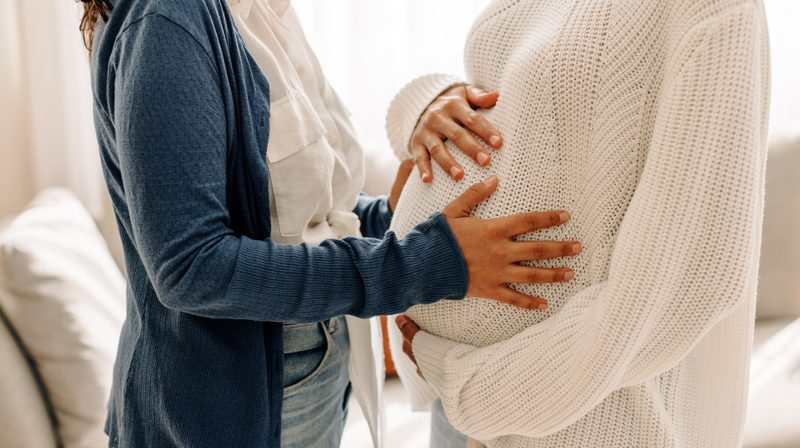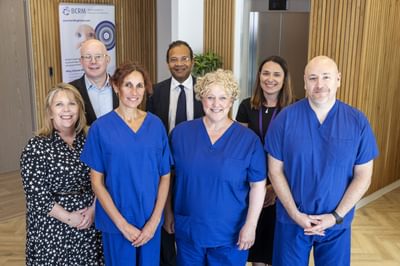Why choose intracouple egg donation treatment?
Intracouple egg donation or reciprocal IVF is an option some same-sex couples choose as it is a treatment option where both partners can feel fully involved in starting a family. It may be a decision made with your doctor depending on your ovarian reserve, medical histories and age. You and your partner may have an idea of who wants to carry the pregnancy or you may choose to take turns if you are planning on having more than one child.

How long does it take?
Reciprocal IVF treatment will take a minimum of 12 weeks from consultation to the results of your pregnancy test. Following your first appointment, if you have chosen to proceed with intracouple egg donation treatment, you will be referred for your first round of screenings to be the "donor" parent. You will also be referred to the Donor Sperm Team who will help you with your next steps in finding donor sperm.
Once you have donor sperm in place and your screening results are back, you will proceed with your IVF cycle.
Under HFEA regulations, you may be able to proceed with a fresh embryo transfer at time of treatment. Further embryos which have been frozen following treatment will need to be quarantined for 12 weeks before a Frozen Embryo Transfer can take place.
(Please note, every person we treat will have different requirements and might take longer than stated above.)
Reciprocal IVF Process:
The steps to Intracouple Egg Donation are as follows. Depending on your personal requirements this might change.
1. Initial Consultation & Tests
Your first step into fertility treatment will be have some initial investigations into your fertility and your consultant will discuss these with you before putting together a treatment plan.
2. Intracouple Donor Screening
The donating partner will need to have the initial donor screening which includes virology NAAT testing, CMV status, Chromosome analysis and Cystic Fibrosis screening. Please be aware the results for the genetic tests can take up to 4 weeks to return.
3. Donor Sperm Selection
You will be referred to the donor sperm team who will guide you through the donor selection process. You will need to attend an implications counselling session before you can proceed to purchasing samples. Your donor samples need to be at BCRM before you can proceed with treatment.
4. Proceeding to Treatment
Once you have had your screening and have your donor sperm in place you will be ready to proceed with treatment. As a first step, you will be given medication to suppress your natural cycle. This will be in a tablet and, depending on your treatment protocol, an injection which you can administer yourself. This medication treatment continues for about two weeks.
5. Boosting the Egg Supply
After your natural cycle has been suppressed, you will attend BCRM for a scan following a bleed. At the time of this scan you will have your second donor screening. You will then be given a type of fertility hormone known as a gonadotrophin. You will usually take this as a daily injection for around 12 days. The hormone will increase the number of eggs you produce. The recipient partner will start medication at this time to prepare their uterus for embryo transfer (if having a fresh transfer).
6. Monitoring Scans
At BCRM we will monitor your progress throughout the drug treatment through vaginal ultrasound scans and, possibly, blood tests. Between 34 and 38 hours before your eggs are due to be collected you will be given a hormone injection to help your eggs mature. This is likely to be human chorionic gonadotrophin (hCG). Both partners will be scanned during this time to ensure the recipient partner is ready for transfer.
7. Collecting the Eggs (Transvaginal Oocyte Recovery)
A hollow needle is attached to the ultrasound probe and is used to collect the eggs from the follicles on each ovary. Afterwards, you may experience some cramps, feel a little sore and bruised and/or experience a small amount of bleeding from the vagina.
8. Fertilising the Eggs
The donor partner's eggs will be mixed with the donor’s sperm and cultured in the laboratory for 16–20 hours after which they are checked for signs of fertilisation. Those that have been fertilised (embryos) will be grown in the laboratory incubator for up to six days. The embryologist will monitor the development of the embryos and the best will then be chosen for transfer.
9. Embryo Transfer (ET) & Embryo Freezing
During the procedure, a doctor or nurse will insert a speculum into the recipient partner's vagina. This is similar to having a cervical smear taken when a speculum is used to hold the vagina open, so the cervix is visible. A fine tube (catheter) is then passed through the cervix, normally using ultrasound guidance. The embryo will be passed down the tube into the womb; this is normally a pain-free procedure. If you are not proceeding with a fresh transfer, your embryos will be frozen at this stage.
10. Quarantine Period
Under HFEA regulation embryos created for donation need to be quarantined for 12 weeks before they can be used for further treatment. To release the samples for further use, a final screening will need to be undertaken.



